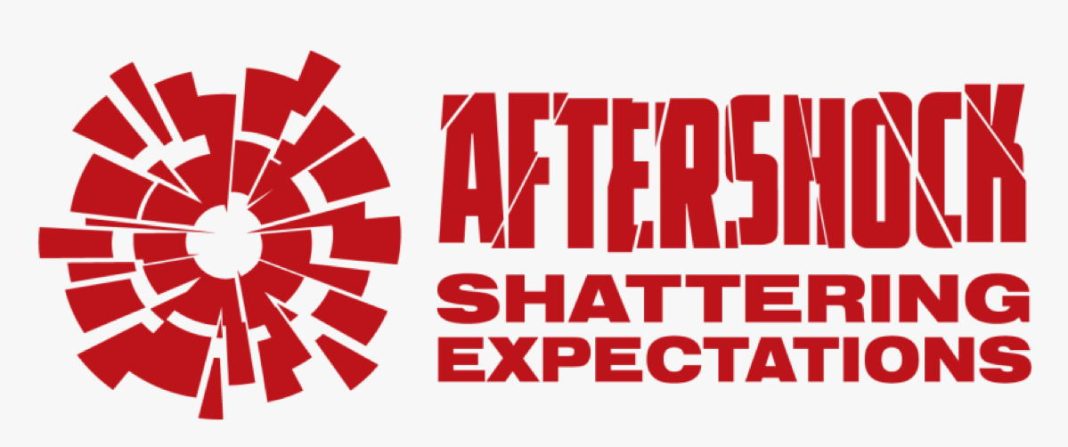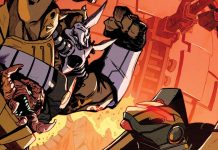In what could be the first company to fall in a 2023 market correction, Aftershock Comics has filed for Chapter 11 bankruptcy in the state of California. Citing between $10-50 million in debts, and the same amount in assets, Chapter 11 is the kind of bankruptcy that allows for operations to continue while debts are reorganized.
Among the largest creditors, $514,326 to UK distributor AS Comics, which seems to be an investment firm which has Aftershock’s Lee Kramer as a director, and $398,887 to Canadian printer Imprimerie L’Empreinte. Other creditors include a list of creators, conventions, and other comics companies you’d expect to see. (Modern Fanatic, The Beat’s ad reps, are listed as a creditor.)
Also today, Rive Gauche Television, a sister production company that merged with Aftershock in 2020 also filed for Chapter 11. Rive Gauche was run by Jon Kramer and Lee Kramer, who were the owners of Aftershock, and had produced popular cable fare such as The Dog Whisperer and Homicide Hunter in the past. Rive Gauche’s top creditor is Jupiter Entertainment, the company behind such shows as Snapped and In Pursuit With John Walsh, to the tune of nearly $1.5 million.
UPDATE: Aftershock released a statement regarding to bankruptcy late yesterday:
After much deliberation, AfterShock Comics LLC has voluntarily filed a petition for protection under Chapter 11 of the United States Bankruptcy Code to enable the Company to restructure its senior secured facility as well as being in a position to secure additional financing to continue to operate its business.
The intent of this decisive action, among other considerations, is to allow the Company to maintain operations in the ordinary course including, but not limited to, paying employees and continuing existing benefits programs,, upholding and following through on commitments to contracted creators, as well as vendors who supply goods and services related to marketing, merchandising and advertising. AfterShock will continue to operate, publish and market comic books and graphic novels to supply to direct market retailers and mass accounts through its distributors in accordance with all federal, state and local guidelines.
We regret the inconvenience this has caused to those we work with and may cause in the near future. However, we believe that going forward this will allow us to best position the Company for long-term success.
You can read the entire filing below, (creators addresses have been redacted) and we’ve reached out to Aftershock for comment, but the general emotion that has been conveyed to us as news spread is one of sadness – but not unexpected sadness. Aftershock put out some good books and worked with some great creators and had good people at the company, like Joe Pruett, Mike Marts and Steve Rotterdam. But their recent financial difficulties as sent ripple effects throughout the industry, as this tweet thread from Christopher Cantwell, creator of the cult TV show Halt and Catch Fire, showed:
Late payments to the artist effectively killed / paused indeterminately an original 4-issue I co-created with Aftershock. Have had good faith convos w/ EIC Brian but w/ 2 issues done, no movement. If within a year you don’t have art costs to finish 2 issues within your budget…
— Christopher Cantwell (@ifyoucantwell) December 14, 2022
The full thread reads:
Late payments to the artist effectively killed / paused indeterminately an original 4-issue I co-created with Aftershock. Have had good faith convos w/ EIC Brian but w/ 2 issues done, no movement. If within a year you don’t have art costs to finish 2 issues within your budget…
…then your whole enterprise should be called into question. This statement says all under contract will be paid… but when? No word on that for months now. Zero direct communication. “Late” at a certain point becomes “non” if your income has a giant hole in it for 6+ months…
Artists, colorists, letterers, & writers should not have to be bookkeepers and accountants for imprints with business affairs, accounting, and legal departments.
On the TV / film side, unions have won important contract terms like “timely” and “pay or play.”
I have been taken care of across the board by every imprint I’ve worked for, including Aftershock, where I’m paid out on the series after delivering all contracted work.
But it rankles when colleagues suffer, taken advantage of for choosing to pursue a vocation they love…
…ignored as if they don’t exist……and when our most valuable assets—our ideas & efforts—languish in the mismanaging hands of those firms (and people!) we trusted with them.
That—and all this armchair devaluing by AI enthusiasts—is frankly dispiriting and fairly infuriating.
And look TV / film is no greener ethical pasture. Entire streaming series are being wholesale deleted in order to escape paying residuals, something unions have just barely carved out in new media (look up the difference between cable / TV resids vs streaming in WGA agreement)
And the amount of free work and writing I’ve done chasing TV / Film pitches and projects that didn’t happen would be staggering and extraordinary if it also weren’t entirely ordinary. I have been paid to pitch precisely once… for the only time I worked on a video game.
It was so shocking to me that I was actually anxious and felt at any moment a mistake would be realized and I would have to give the money back.
Unfortunately, fear of reprisal / overcompensation has been baked into the artistic trade as a pathology at this point.
If we let that fester, and accept continued devaluation in any form, then corporatized slight-of-hand and exploitation will only persist and get bolder and more egregious.
At the end of the day, it’s important to remember: they can’t do what we do.
So they should pay us for what we do.
On time.
And they should treat us with respect, through proper professional communication about project status / financial issues.
Anyway, the fight for fair compensation, the only American pastime I love more than baseball.
Aftershock is the first major comics company to file for bankruptcy in some time (but it may not be the last – another company is informally reorganizing as we speak.) Obviously this will be topic 1 for a while – we’ll up date the story as events warrant.
Note: a list of unsecured creditors with home addresses has been removed from both these documents.
Creators who are owed money by Aftershock include:
- Alberto Alburquerque
- Alex Cormack
- Alex Pruett
- Alex Segura
- Andrea Mutti
- Andrea Olimpieri
- Andrew Clarke
- Andrew Iwamasa
- Andrew T. MacDonald
- Anthony Cleveland
- Brett Schenker
- Brian Hawkins
- Brian Thomas Buccellato
- Bryan Hill
- Carlos Mangual
- Carmelo Zagaria
- Charles J. Burgio
- Charles Pritchett
- Chris O’Halloran
- Christopher W. Sebela
- Cliff Richards
- Cody Joy
- Corey Breen
- Cullen Bunn
- Dan Abnett
- Daniel Lopez
- David Harris
- David Hazan
- David Lawrence Johnson
- David Sharpe
- Dee Cunniffe
- Denilson Santtos
- DJ Chavis
- Dorothy LeAnn Sukman
- Edward M. Catto
- Elliott Kalan
- Eric O’Connor
- Erica Schultz
- Eva de la Cruz
- Francesco Segala
- Francisco Biagini
- Gioele Filippo
- Grant DeArmitt
- Grant Woodard
- Hassan Otsmane-Elhaou
- Hayden Sherman
- Jack E Maraglia
- Jacob Cannon
- Jacob Phillips
- Jamal Igle
- James Gonyea
- Jason Wordie
- Jawad Qureshi
- Jeff A Spry
- Jeremy Haun
- Joe Crohn
- Joe Mulvey
- Joe Pruett
- John Lees
- John Siuntres
- Jonathan Kramer
- Jonathan Luna
- Jose Holder
- Jose Villarrubia
- Joseph Eisma
- Joshua Strausbaugh
- Joshua Waldrop
- Juan Ignacio Velez Gaitan
- Juan Navarro
- Julio Martinez Perez
- Justin Macuga
- Justin Owen Smith
- Kelly Fitzpatrick
- Kevin Wayne Smith
- Kieran McKeown
- Korey Bell
- Laurence Campbell
- Lee Andrew Kramer
- Lee Loughridge III
- Lorenzo Scaramella
- Manuel Mendiola
- Manuel Puppo
Marcelo Maiolo - Mario Lorente Diez
- Mark Sable
- Mark Torres
- Matt Herms
- Matt Krotzer
- Matthew Alward
- Matthew Sabatino
- Mattia Monaco
- Maxmiliano Dallo
- Michael J Clarke
- Michael J. Marts
- Michael Leonor
- Michael Lightell
- Mike Marts
- Mike Rooth
- Mitchell S. Gurowitz
- Tim Stolzfus
- Nate Townsend
- Nick Filardi
- Nick Santora
- Olivia Briggs
- Orhan Umut Gokcek
- Pablo Raimondi
- Pat Olliffe
- Paul Azaceta
- Paul Taegel
- Paul Tobin
- Peter Marsh
- Peter Milligan
- Peter Tomasi
- Piotr Kowalski
- Rae Hancock
- Rafael de Latorre
- Remus Brezeanu
- Rex Ogle
- Ricky Mammone
- Rob Steen
- Robert Schwager
- Roberta Ingranata
- Rod Gonzalez
- Rodrigo Moron de Migue
- Roy Miranda
- Bajo A Mostoles
- Ruben Rubine Cubiles
- Rudy Vela
- Russell Jacob Singer
- Russell James Wooton
- Ruth Reeves
- Ryan Lindsay
- Sal Cipriano
- Sam Freeman
- Sam Romesburg
- Sami Kivela
- Sara Colella
- Shawn Lee
- Simon Bowland
- Slade Germain
- Stefano Nesi
- Stephan Nilson
- Stephanie Phillips
- Stephen Thompson
- Steve Orlando
- Sullivan Fitzgerald
- Szymon Kudranski
- Tara O’Connor
- Taylor Esposito
- Tom Novak
- Tonci Zonjic
- Trinity Peck
- Tyler Boss
- Valentina Bianconi
- Valentina Briski
- Van Jensen
- Wesley C. St. Claire
- William M Noftz
- Zac Thompson
Redacted – AfterShock Comics, LLC-22-11456
Redacted – Rive Gauche Television-22-11457 copy








Less publishers is (obviously) never a good thing. That said, the writing has been on the wall with Aftershock for some time if you ask me. Whereas at the start of the company, they had high-profile creators working on a variety of projects, the last year has seen them put out books by lesser known (mostly) creatives. That hinted that creators with options and/or clout were turning away from them, while creators that didn’t have that profile were getting projects published through Aftershock.
The biggest alarm bell was Mike Marts leaving. It would be one thing if Marts had landed at a bigger publisher with some cushy title, but the guy left to go to Mad Cave which sure appears to be a small publisher than even Aftershock.
Why would they owe half a million to a distributor? Wouldn’t the distributor get paid when they sold the comics to stores? Why would a convention give them credit? Are they giving out booths on the honor system? Nearly $400k to a printer must represent print runs on multiple different issues. Why not cut them off way earlier? I get how they can screw over creators who don’t have the time or money to sue (and are afraid of getting blacklisted if they do), but they don’t have that kind of power over printers or distributors. I don’t understand why those businesses would just let an indie publisher run up huge tabs like that.
Remember, this is a working reorganization. NOT. A closure.
Sad.
Market correction lol? What a joke. It’s the same old same old market that sucks.
Except for big names, I could see more publishers not the big 2 going the Image route of creators only being paid when books make money. No page rates. They may trade partial media rights for fronting printing costs.
The challenge with going the Image route is publishers like Aftershock want the media rights, because that’s where the money is. At least it was, before Hollywood started to pull back on spending a bit due to concerns around the fall of cable and streaming leveling off.
With respect to Aftershock, I always felt it was fairly obvious that the majority of their books were designed to try and get the attention of Media studios, even if the direct market/trade market audience was a lot less clear.
@Tony Harris: Obviously you are correct, but it’s going to be a long road back (if they survive) for them. Hard to imagine anyone, but the most desperate, of creators being willing to bring their books to Aftershock considering the payment concerns and financial unsteadiness of the company overall. Combine that with readers potentially being turned off by their actions towards creators when it comes to payment, the road ahead for the company is going to be difficult.
If a comic publisher’s model of success is licensing to film/tv, they’re distracted from making and selling good comics. Its a whole different business to be in. I’m sick of IP farms pretending to care about comics and predictably crashing, leaving the otherwise sustainable comics folks shit out of luck.
@Avi: Agreed. Part of the reason I am so impressed with Ahoy is I get the impression that 90% of the focus of the company is just making and selling good comics. If Hollywood buys up an IP they publish, great, but it’s not the sole reason they publish anything. Aftershock, AWA, Vault, Valiant, etc. all feel the opposite to me.
Comments are closed.